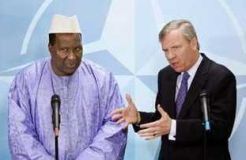NATO considers help for African Union force in Darfur
BRUSSELS, May 17, 2005 (AP) — The North Atlantic Treaty Organization will Wednesday consider a request from the African Union for non-combat aid for the AU’s beleaguered peacekeeping force in the Sudanese region of Darfur.

|
|
African Union (AU) commission chairman Alpha Oumar Konare (L) addresses a joint news conference with NATO Secretary General Jaap de Hoop Scheffer at the end of a meeting at the NATO headquarters in Brussels May 17, 2005. (Reuters) . |
The AU’s Commission’s president Alpha Oumar Konare said at NATO headquarters Tuesday he was seeking logistical support but insisted that troops on the ground will be exclusively African.
“The African Union is in the lead,” said NATO Secretary-General Jaap de Hoop Scheffer after meeting with Konare at alliance headquarters. “NATO will see what it can do in support.”
The issue was expected to be discussed at Wednesday’s regular meeting of NATO ambassadors.
“NATO must decide very quickly,” de Hoop Scheffer said, adding he had been invited to a May 26 meeting in Addis Ababa, Ethiopia, to discuss the crisis further.
De Hoop Scheffer insisted the alliance would not impose itself. “NATO does not want to be the policeman of the world,” he said.
NATO officials have suggested alliance help could include transport, communications and planning for an expanded military mission.
France has been reticent about NATO involvement, saying the European Union is better placed to help. Paris is worried that NATO involvement in Africa could undermine France’s traditional influence on the continent.
The E.U. has sent military advisers to help the AU mission and is spending EUR92 million to cover almost half the costs of the operation.
The Darfur conflict erupted in February 2003 after rebels took up arms, complaining of discrimination by Sudan ‘s Arab-dominated government. The government is accused of responding by backing a scorched-earth counterinsurgency by Arab militias.
War-induced hunger and disease has killed more than 180,000 people, according to U.N. estimates. At least 2 million have been made homeless by the conflict. No firm estimates of the number killed in fighting exists.
